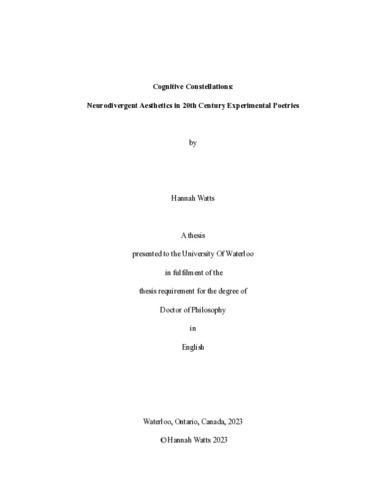| dc.description.abstract | “Inaccessible” is a term shared by both Critical Disability Studies (CDS) and literary criticism, although this term means different things to each discipline. For CDS, an inaccessible space is one that prevents physically or cognitively disabled people from fully participating as valued members of society. For literary scholars, “inaccessible” refers to strategies used by authors to estrange readers. Inaccessible techniques necessitate strenuous close reading, and may either in- crease or decrease the absorption and investment a reader experiences. Inaccessible strategies are often present in texts labelled “experimental” or “conceptual.” However, some of the techniques modern and post-modern authors use in order to estrange readers mimic or perform disabled pat- terns, practices, and aesthetics. Ironically, the cultural value assigned to famous inaccessible texts often separates poetic techniques from disabled people’s embodied experiences; scholars may praise representations or metaphors of disability while rejecting disabled perspectives as valuable critical lenses for reading literature. In this way, inaccessible texts may also become inaccessible literary spaces that perpetuate ableist academic systems. For example, even if a literary scholar identifies as neurodivergent (a person with a cognitive disability) they are still expected to write in neurotypical forms, and interpret literature using neurotypical methodologies: they still must “access” ability to be academically successful. This project joins interdisciplinary scholarship that refuses to categorize CDS and English Literature as discrete areas of study, but suggests that physically and cognitively disabled aesthetics illustrate important reading values. This is especially true for scholarship that already acknowledges the presence of disability in inaccessible poetic texts without naming or engaging with disabled perspectives. This dissertation tracks some of the ways that readers have reacted to disability aesthetics in experimental texts like James Joyce’s Finnegans Wake, Gertrude Stein’s Tender Buttons, and Hannah Weiner’s Code Poems. It traces how ableism, specifically ideas associated with the pseudoscience of eugenics, is connected to “inaccessible” labels bestowed on these texts. This project then offers readers creative interpretive modes that will help them engage with and explore disabled aesthetics in the text instead of dismissing such poems as too difficult, or diagnosing them as symptomatic of a disabled writer and therefore not worth reading. This dissertation is also written using the form of my own neurodivergent expressive practice, ADHD, as one example of how literary scholarship might encourage scholars to celebrate their neurotype instead of leaving it behind in favour of the exceptional level of ability expected in academic spaces. | en |

